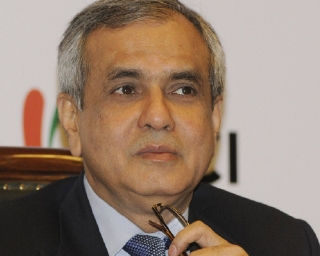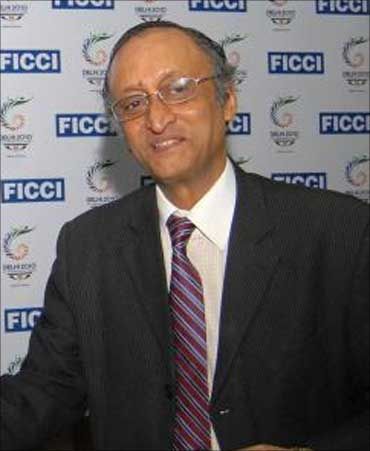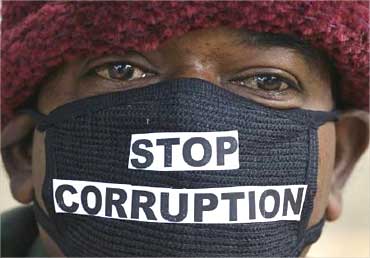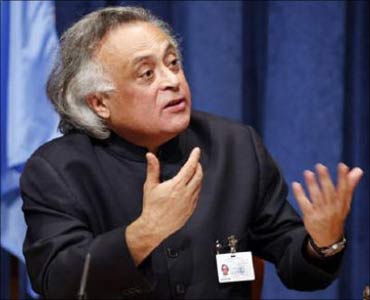Photographs: Reuters Indivjal Dhasmana and Sanjeeb Mukherjee in New Delhi
After almost 17 years, the Federation of Indian Chambers of Commerce and Industry has to do without its veteran secretary general, Amit Mitra, who has now become finance minister of West Bengal.
In his place, Ficci has appointed its director general, Rajiv Kumar, 59, a reputed economist.
He talks to Indivjal Dhasmana and Sanjeeb Mukherjee on the new charge.
Edited excerpts:
Ficci is known after Amit Mitra. How will you fill the gap?
He has left behind a huge legacy. I can't ever hope to substitute him. He has brought the chamber to the current level; I will build upon that legacy.
Amit has been able to build Ficci as a national brand.
...
Ficci head wants to turn it into a global brand
Image: Kumar says he will build upon Amit Mitra's legacy.Photographs: Reuters
Whenever people think of India, they will think of Ficci as a place they could go to facilitate investment, to come up with new thoughts and ideas.
There are a slew of corruption charges against very powerful government functionaries and corporate bigwigs. What is the way forward?
Ficci passed a resolution in Kolkata in December, saying these charges are hurting the image of India.
There are a number of provisions in the law that encourage rent-seeking. That kind of corruption has to be finished.
...
Ficci head wants to turn it into a global brand
Image: Kumar says there is no single mantra to tackle corruption.Photographs: Reuters
Then, you have to continue with reforms to generate employment. Employed people generally make everybody accountable.
Given the harsh position on land acquisition from various sides, what will Ficci stand for?
The Haryana model of compensation and rehabilitation, accepted by the Ashok Chawla committee, should be followed. (This model has a one-time payment for land as well as providing long-term annuity and jobs to farmers whose land is acquired.)
...
Ficci head wants to turn it into a global brand
Image: Jairam Ramesh will hold regular meetings over coal mining issue, says Kumar.Photographs: Reuters
The UPA, Ficci and all of us have to refocus even more sharply on the reform agenda.
The second generation reforms we have been talking of have to take roots and be implemented.
The more we focus on reforms, the more we will be able to generate employment, the better we will be able to sustain the growth rate.
In the wake of the Go/No-Go controversy, where do you see our coal mining policy?
We have taken up the issue of with the environment ministry. Environment Minister Jairam Ramesh has assured us that he will hold a quarterly meeting with the industry over the issue.
One such meeting was held last month.
...
Ficci head wants to turn it into a global brand
Image: He says coal monopoly should end.Photographs: Reuters
Despite huge coal reserves, we are not using the fuel to the optimum. What is Ficci doing to make government change its policy?
The way we are going, we soon will be importing 100 million tonnes of coal (in a year). Our dependence on hydrocarbon imports, both crude and coal, will be unsustainable.
At the same time, we have huge amounts of reserves. They are not of the best quality, but if you combine proper technology, even when you wash our coal and the cost rises from, say, the current $30 a tonne to $40-45 a tonne, it will be much lower than the $100-120 a tonne that you import.
My hope is we will be able to sort out our policy and produce the kind of coal the country needs. We need to finish the monopoly of Coal India, just as we ended monopolies in telecom.
...
Ficci head wants to turn it into a global brand
Image: We need to remove constraints on the supply side, says Kumar,Photographs: Reuters
We start talking about inflation when it is too late. We have to talk about inflation before it becomes a problem.
In a poor country, you should not be in a position to constrain demand to fight inflation. We are poor, our demands are genuine demands.
What we have to do is to focus on removing constraints on the supply side, and remove them in anticipation. If we do this, we will not have inflationary episodes.
If we do, you have to rely on monetary and fiscal policies to squeeze it out.
Doing it only by monetary policy and not monetary and fiscal policies together is going to be harmful. Then, we will have to stop growth.








article